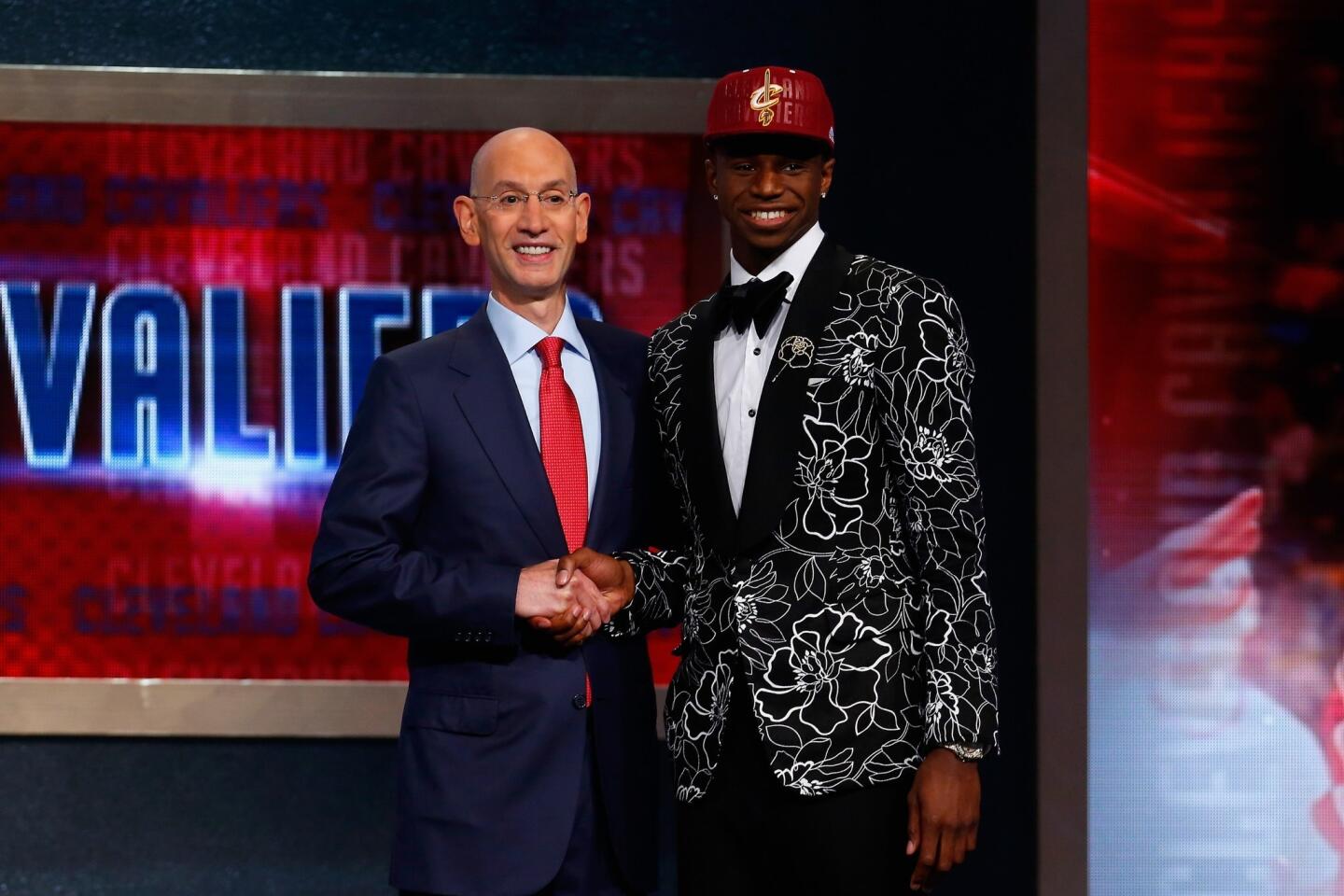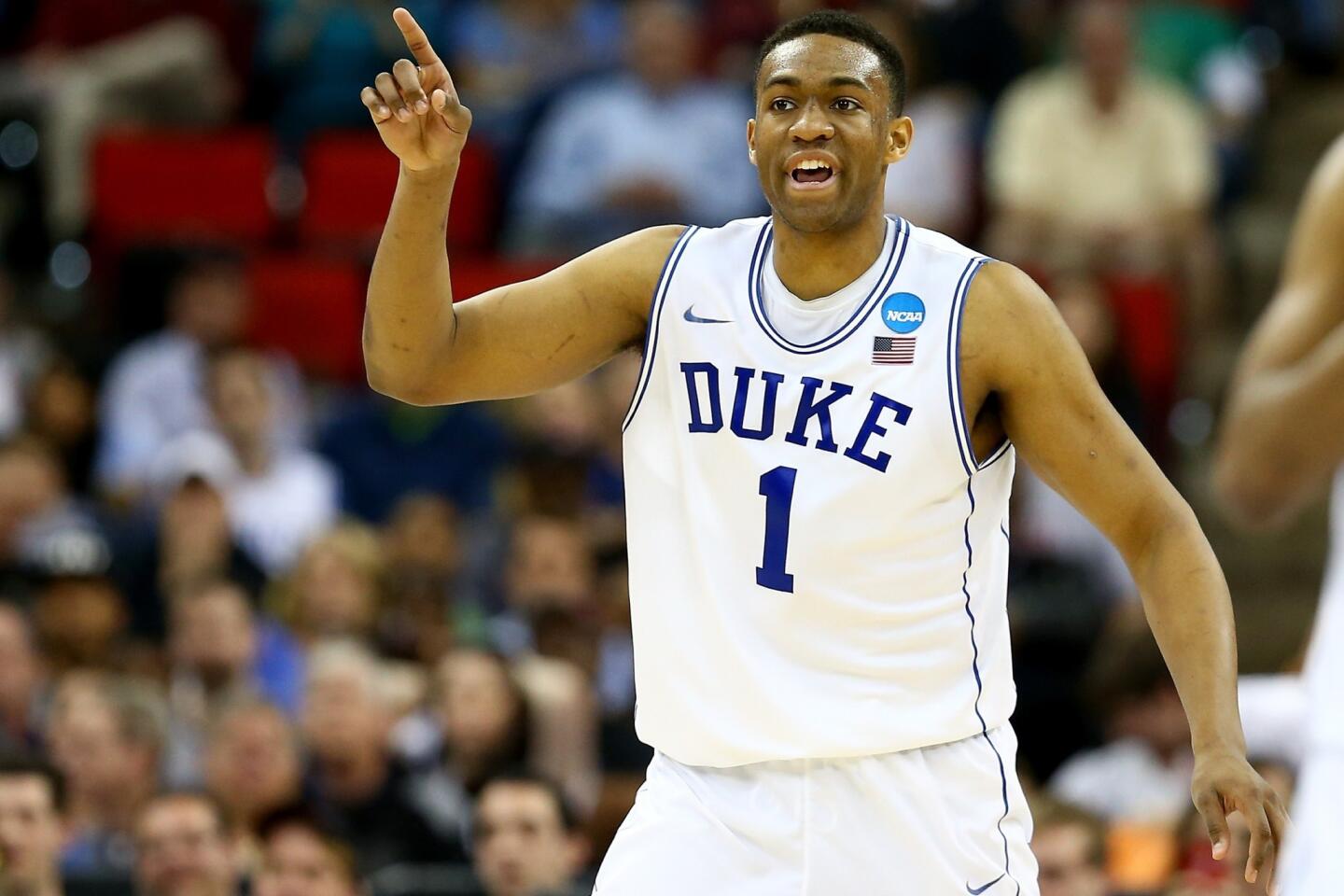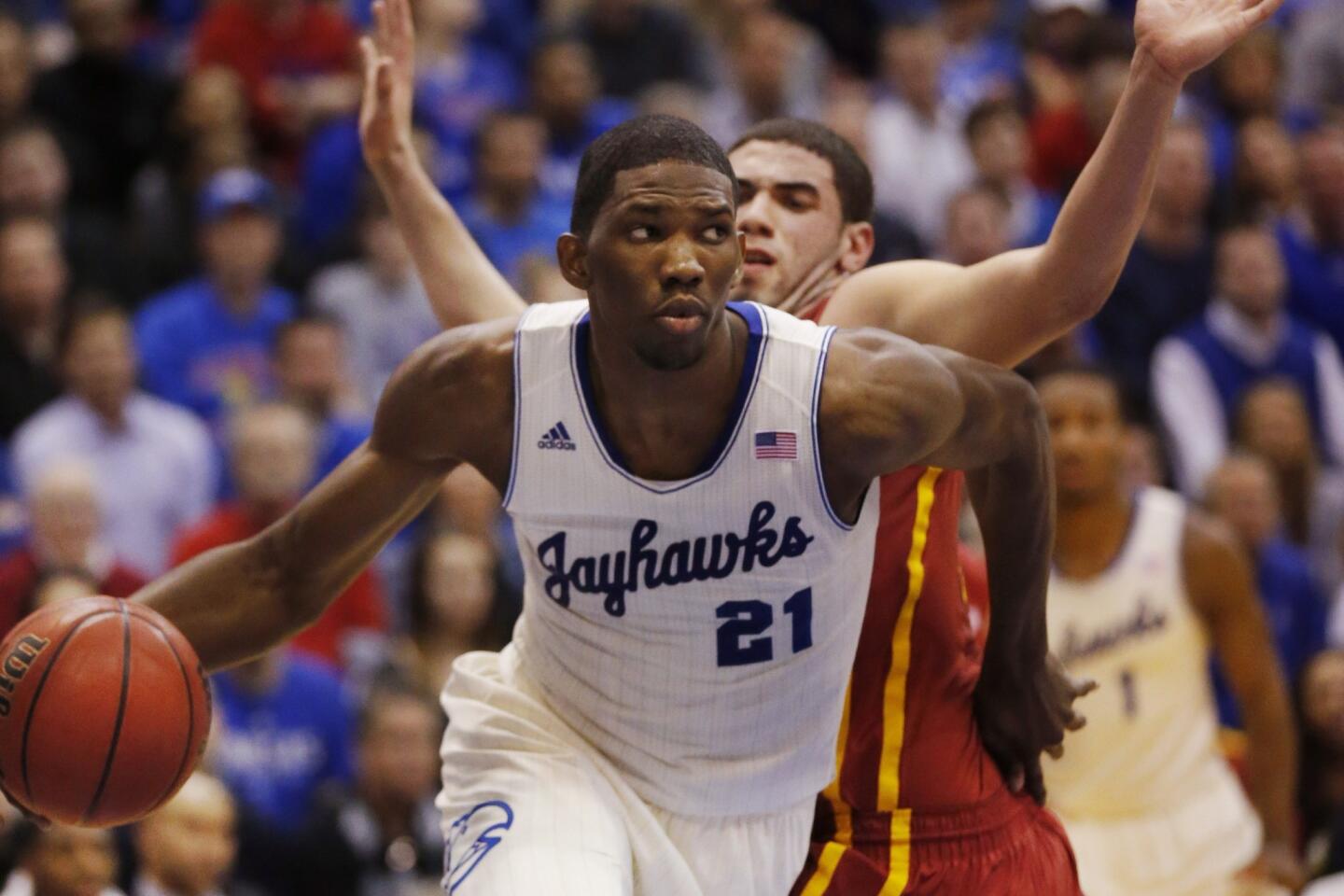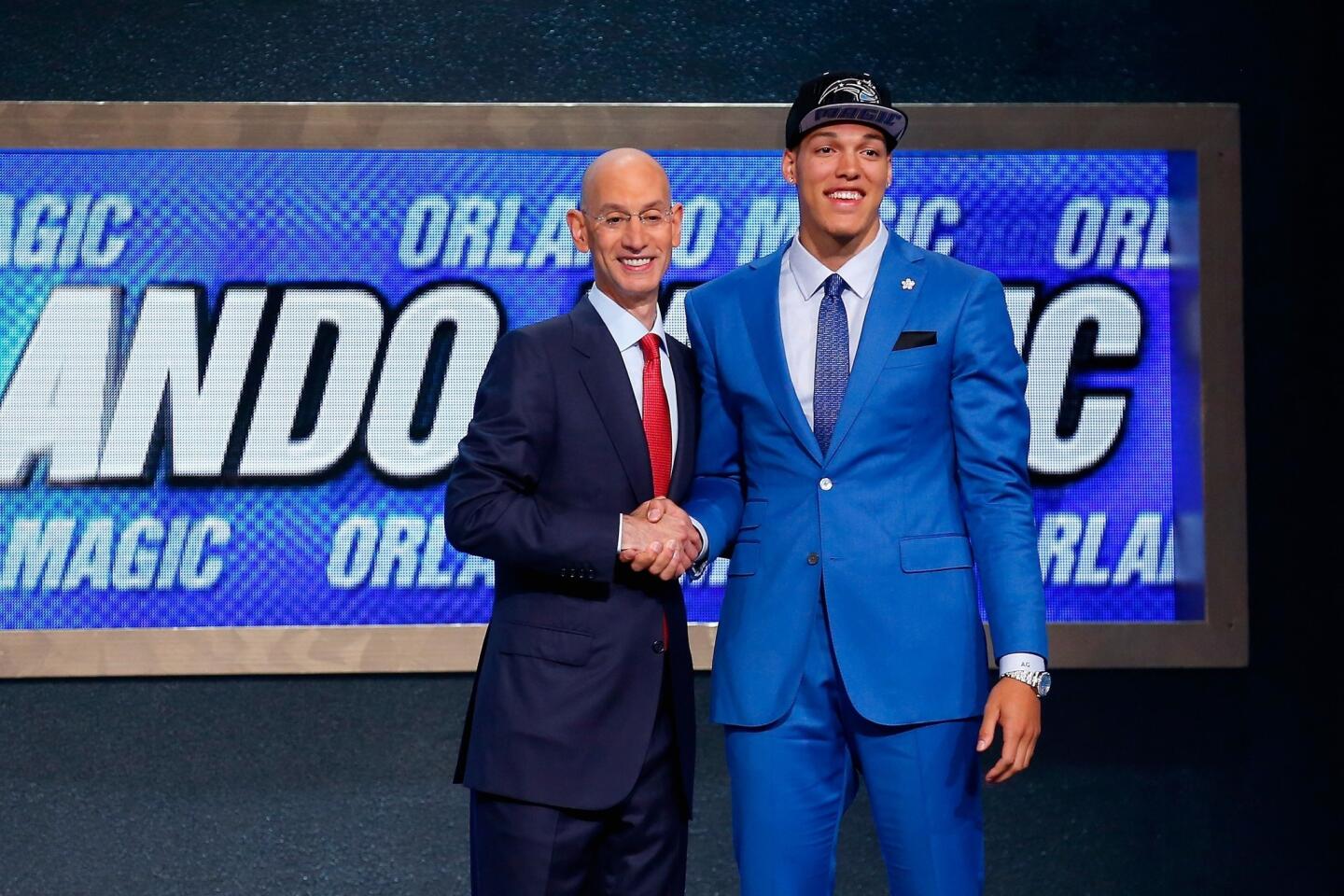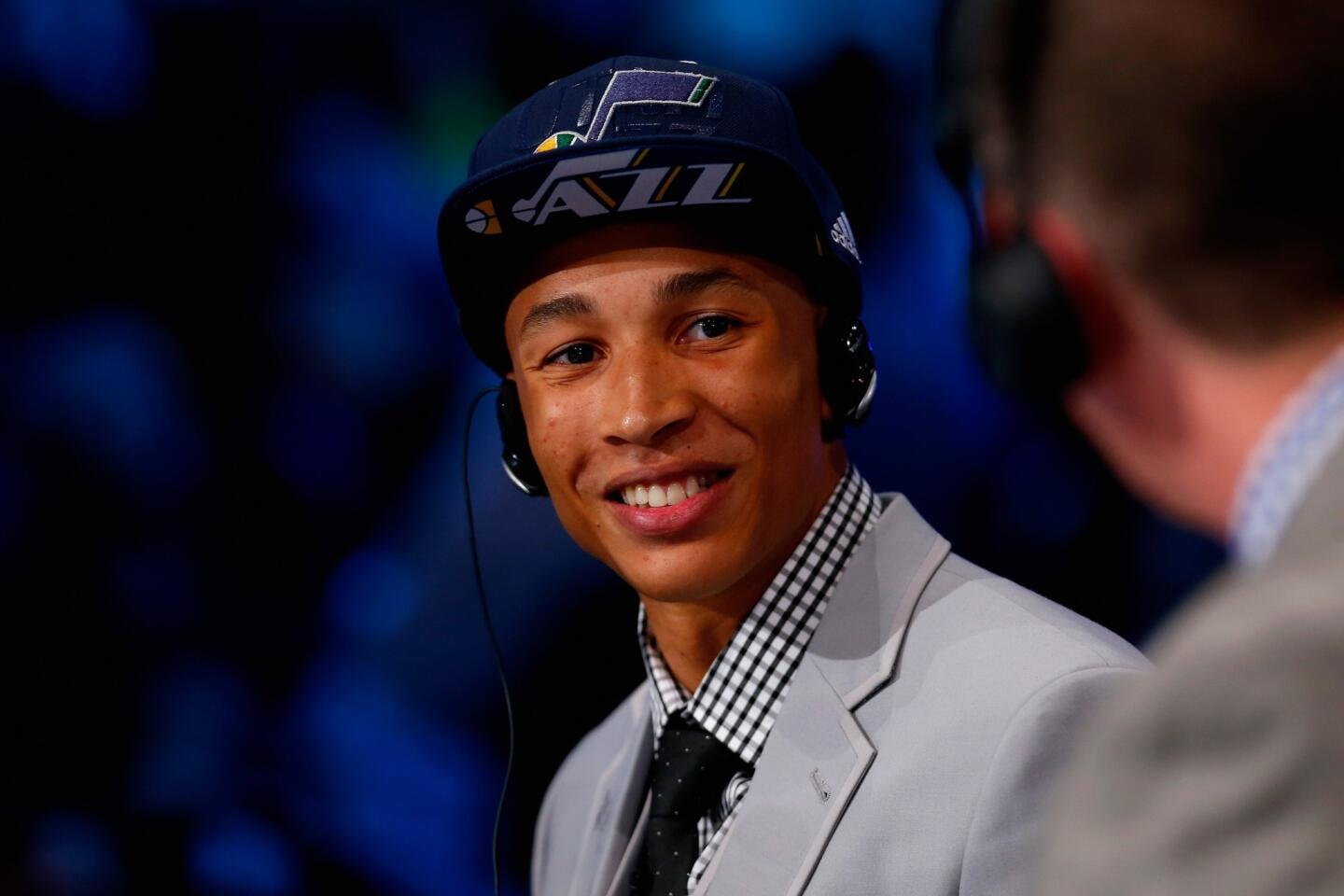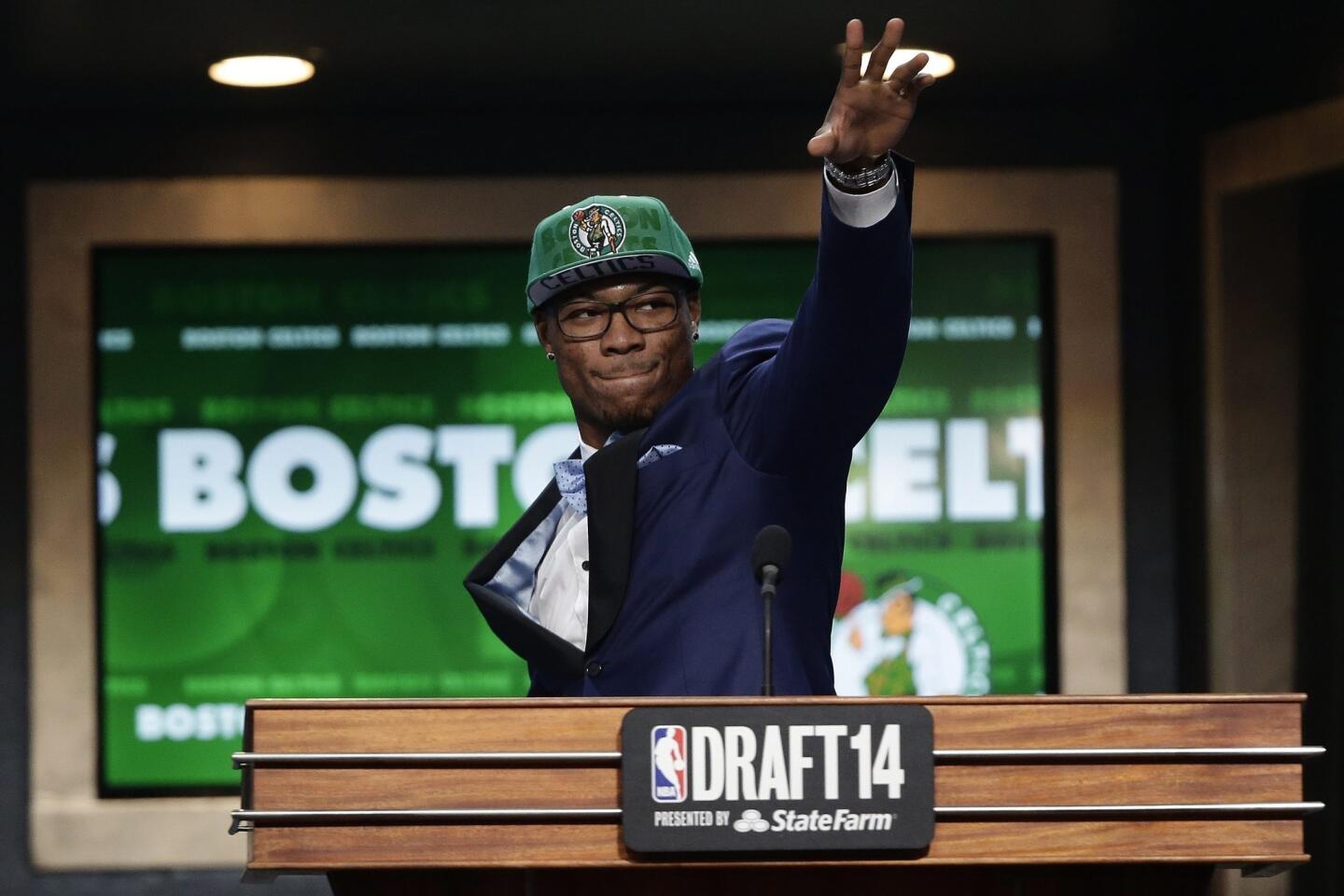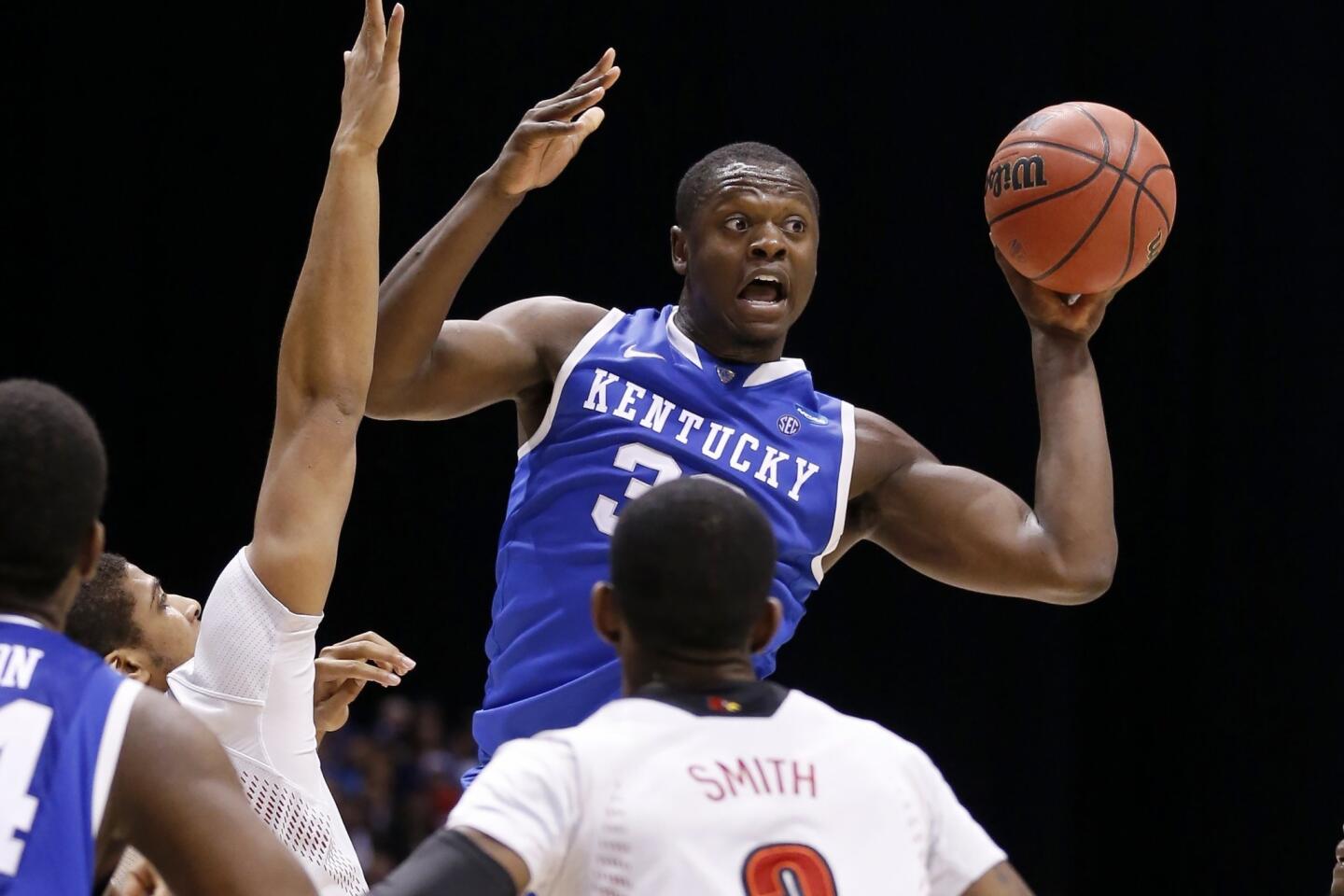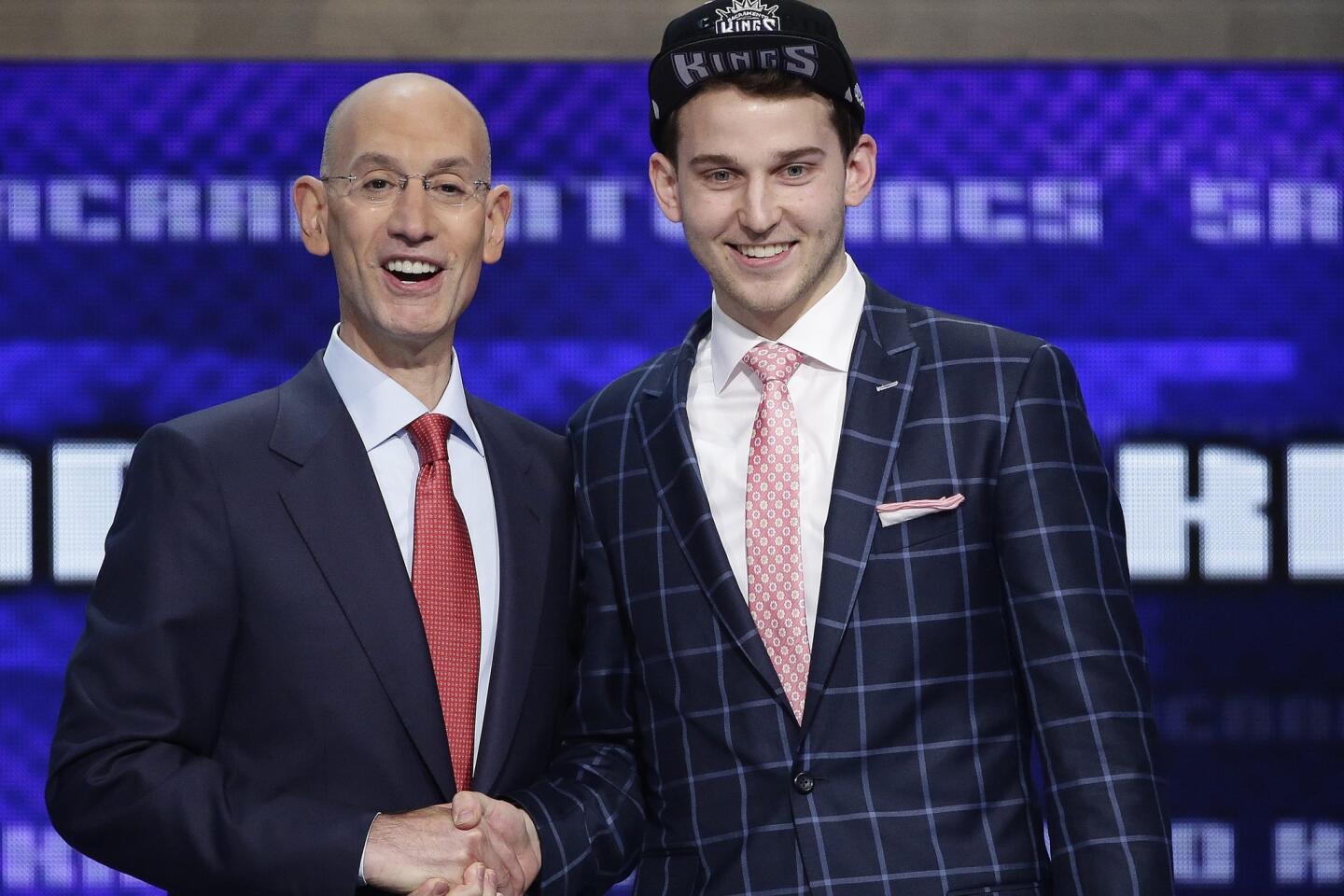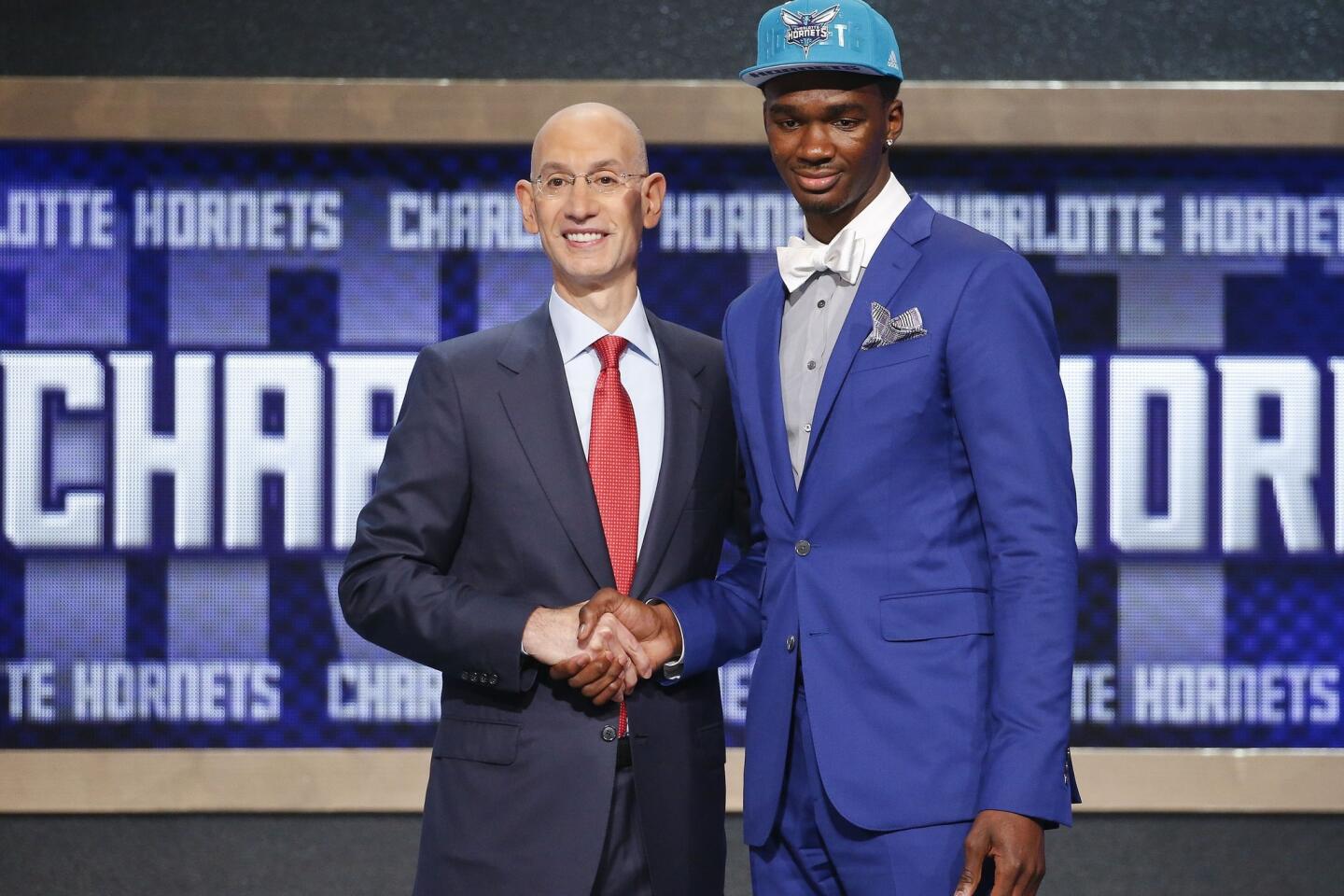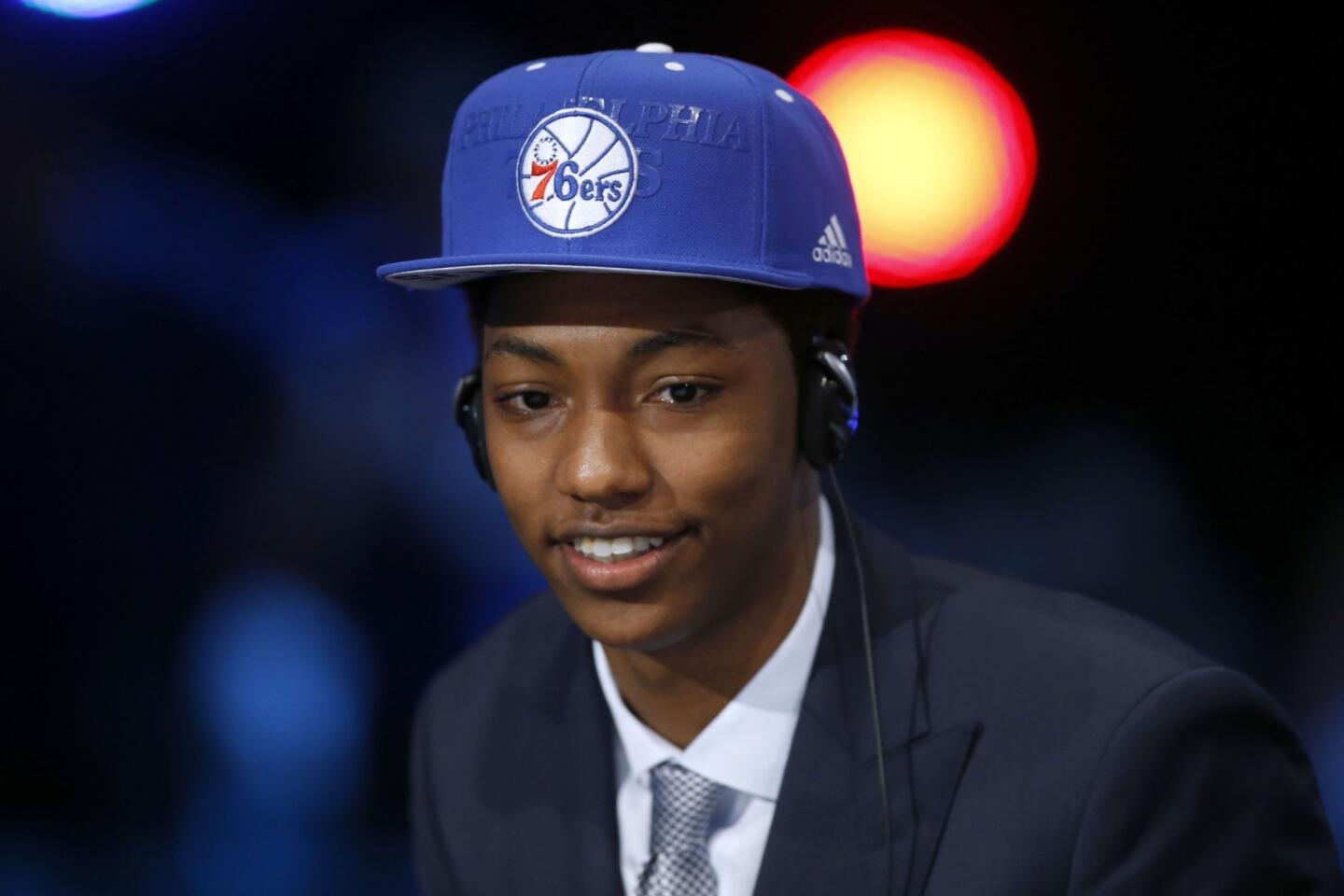NBA Draft: Cavaliers select Andrew Wiggins with No. 1 overall pick
- Share via
The Cleveland Cavaliers took Kansas small forward Andrew Wiggins with the first overall pick in the 2014 NBA Draft.
The draft has shaped up to be one of the most open ended in years because the presumed No. 1 overall pick, Kansas center Joel Embiid, suffered a stress fracture in his foot and had surgery last week.
Today is a key day as well for the Lakers, who have the seventh overall pick. It’s the first time since 2007 that the Lakers have a first round pick; every year since then they have either sold or traded away their selection.
FIRST ROUND
No. 1 -- Cleveland Cavaliers -- Andrew Wiggins, 6-8, 200, Kansas, small forward
Before his freshman season at Kansas, Wiggins was seen as the best NBA prospect since LeBron James, so good that Sports Illustrated put him on the cover in comparison to Jayhawks legend Wilt Chamberlain. Then, the season started. Defensively, he was superb, but offensively, Wiggins was erratic. He finished the year averaging a hair over 17 points and six rebounds a game, which is good for most players but apparently not good enough for the second coming of LeBron. Regardless, going into draft day he was almost guaranteed to go in the top three.
Ben Bolch: Cavs took upside over polished product but already have concerns about fashion sense.
No. 2 -- Milwaukee Bucks -- Jabari Parker, 6-8, 235, Duke, power forward
Parker is another case of a player who got a ton of attention in high school and couldn’t mask the impossible expectations set up for him in college. He averaged 19 points and almost nine rebounds, but was inconsistent offensively and sometimes just plain bad defensively. The argument could be made that Parker wasn’t used in a position to best showcase his abilities at Duke, as he often played power forward and sometimes center in small-ball lineups. In the NBA, he’ll probably be a larger small forward. Offensively, he’s one of the best pure scorers in the draft, but he’ll need to improve his defense at the next level.
Ben Bolch: Most NBA-ready player headed to team barely qualifying for league accreditation.
No. 3 -- Philadelphia 76ers -- Joel Embiid, 7-0, 250, Kansas, center
Embiid was widely considered the No. 1 overall pick, but suffered a foot injury a week before the draft. He underwent surgery for a stress fracture in his right foot, and it’s unknown when he’s going to be able to play. He didn’t start playing basketball until he was 16 years old. The versatile 7-footer had a jaw-dropping freshman season with the Jayhawks, averaging 11.2 points and 8.1 rebounds while blocking 72 shots to earn Big 12 defensive-player-of-the-year honors, before suffering a stress fracture in his back. Injuries aside, he’s a potential franchise center who can run, shoot and defend with the quickness of a guard. Scouts say he has the potential to be a 7-foot Serge Ibaka.
Ben Bolch: Big man could follow in injured footsteps of Nerlens Noel and sit out entire season.
No. 4 -- Orlando Magic -- Aaron Gordon, 6-7 1/2, 220, Arizona, power forward
He’s young (18), athletic (39 inch vertical), and averaged close to a double-double (12.4 points and eight rebounds on one of the best teams in the country. He also grew more than 1 1/2 inches in his freshman year at Arizona. Still, scouts are concerned about how his offensive game will translate to the pros. He’s small for a power forward, but probably doesn’t dribble or shoot well enough to be a small forward and his free-throw shooting was 42%. Gordon also faded down the stretch his freshman season. His ceiling’s high, but it’s going to take a team convinced it can figure out how to maximize his potential for him to be a lottery pick.
Ben Bolch: Surprise pick can play both forward positions but can’t shoot free throws (42.2%).
No. 5 -- Utah Jazz -- Dante Exum, 6-4 1/4, 196, Australia, point guard/shooting guard
As is the case with many 18-year olds who didn’t play basketball in America, Exum’s draft stock is hard to gauge. The No. 1 international prospect in the draft is a tall point guard who can shoot, and has a frame that will make it easy to put on muscle. At the same time, it’s telling that his NBA comparisons range from Penny Hardaway to Leandro Barbosa. He might get passed up for more recognizable players, but he’s high on scouts’ draft boards for a reason.
Ben Bolch: Dynamic guard from Australia has the kind of game that plays well anywhere.
No. 6 -- Boston Celtics -- Marcus Smart, 6-2, 227, Oklahoma State, point guard
Built like a cannonball, Smart is the best point guard prospect in this draft. He had his fair share of issues at Oklahoma State, including a suspension for shoving a fan, but seemed to settle down at the end of the year. Although he measured a bit shorter than expected, he also has a 6-foot-9 1/4 wingspan and has always been able to finish at the rim. Smart could have left Oklahoma State after his freshman year and been in the running for the No. 1 overall pick in last year’s draft. That talent still exists, albeit in a deeper draft. Point guards are always a hot commodity in the NBA.
Ben Bolch: Big question is whether point guard will be backup to Rajon Rondo or replacement.
No. 7 -- Lakers -- Julius Randle, 6-7 3/4, 249, Kentucky, power forward
Randle is one of those college players who put up big numbers in school, but it’s hard to see how their games will translate into the NBA. Randle was a double-double machine at Kentucky, averaging 15 points and 10.4 rebounds, but his game had more to do with his size and ability to plow through defenders than footwork or fundamentals. He has a decent shot, but just average size for an NBA power forward and won’t be able to get to the rim by purely lowering his shoulder. He was a very, very good player at Kentucky, but we’ll see if he can make adjustments for the pro game.
Ben Bolch: Lakers hope power forward emulates Zach Randolph except his 2.8 ppg. as rookie.
No. 8 -- Sacramento Kings -- Nik Stauskas, 6-5 1/4, 206, Michigan, shooting guard
Anyone who watched college basketball last season knows that Stauskas is one of the best shooters in the country. That was apparent from his first day in Ann Arbor. But Stauskas also has the ability to put the ball on the floor. He was the Big Ten player of the year by scoring almost 18 points a game, and evolved from a shooter to a threat to drive as the season went on. He’s a big shooting guard who can also jump, and might be one of the most NBA-ready players in the draft.
Ben Bolch: Kings picked sharpshooter after considering input from five analytic-minded fans.
No. 9 -- Charlotte Hornets -- Noah Vonleh, 6-8, 247, Indiana, power forward
Vonleh’s hands are the second-largest ever measured at the NBA combine, an otherworldly 9.75 inches long by 11.75 inches wide. Why is this important? Well, Vonleh is the best rebounder in this draft class. He pulled down nine rebounds in only 26 minutes a game, which led the Big Ten. He also doesn’t turn 19 until August, shot 49% from three-point range, and has a 7-4 wingspan. He’s not as developed as some other top prospects, but the sky is the limit for how good he could be.
Ben Bolch: Hornets didn’t even work him out because they didn’t think he would fall this far.
No. 10 -- Orlando Magic -- Elfrid Payton, 6-2 1/2, 185, Louisiana Lafayette, point guard
Payton is going to be drafted based on potential alone. He averaged almost 20 points and six assists, but that was against Sun Belt competition. It also doesn’t help that Payton averaged almost four turnovers and shot 26% from three-point range last season. Still, he’s a tall point guard who is explosive off the dribble and is a good defender. The team that drafts Payton is banking on the idea that they can help him develop a shot, otherwise Payton has a strong chance of becoming the next Devin Harris.
Traded to Orlando Magic for No. 12 pick Dario Saric.
Ben Bolch: Under-the-radar pick will be expected to quickly produce in prime time.
No. 11 -- Denver Nuggets -- Doug McDermott, 6-6 1/4, 218, Creighton, small forward
McDermott is another player who is going to have to make adjustments in the professional game. The senior can flat-out score, as his 26.7 points and 7.0 rebounds were the only reason Creighton was ranked last season. His ideal position in the NBA is small forward, but he’s not quick enough to guard the position defensively. At the same time, he’s probably too small to be a consistent power forward. His future might be as more of a stretch-4 — someone who can score in bunches on a team that can hide his defensive shortcomings. On the right team, McDermott could be a very solid NBA player.
Traded to Chicago Bulls for No. 16 and No. 19 picks.
Ben Bolch: Prolific scorer was a mile-high mirage for Nuggets fans before trade to Chicago.
No. 12 -- Orlando Magic -- Dario Saric, 6-10, 223, Croatia, power forward
Scouts say Saric has the potential to be the most offensively versatile player in the draft. He’s 6-10 but can handle the ball and score in transition, and he led the Adriatic League in scoring at 17 points a game. His biggest issue is that he’s very thin and won’t be able to bang in the post with traditional NBA power forwards. But he could play small forward in the right situation.
Traded to Philadelphia 76ers for No. 10 pick Elfrid Payton and future draft picks.
Ben Bolch: Philly fans won’t make Croatian big man feel at home if his game founders.
No. 13 -- Minnesota Timberwolves -- Zach LaVine, 6-4 1/2, 180, UCLA, shooting guard
The official buzzword around LaVine is “upside.” He grew several inches in his one season in Westwood, and at a workout with the Lakers he blew away the buzz on the Internet with an unofficial 46-inch vertical jump. One blog called him “Russell Westbrook 2.0” due to LaVine’s incredible athleticism, which didn’t necessarily translate at UCLA. He averaged 9.4 points, 2.5 rebounds and 1.8 assists on less than eight shot attempts. A team won’t draft LaVine based off what he was his freshman year — it will draft him based off what he could be.
Ben Bolch: Timberwolves now flush with Bruins unless they trade Kevin Love.
No. 14 -- Phoenix Suns -- T.J. Warren, 6-7, 220, North Carolina State, power forward
The biggest question surrounding Warren isn’t whether he can score. He averaged almost 25 points a game in his sophomore season. The biggest question is what position Warren is going to play. He’s somewhere between a short power forward and a slow small forward. His shooting percentages weren’t great (53% from the field, 27% on three-pointers), but he can get to the free-throw line (attempted almost seven a game) and he averaged more than seven rebounds. He can play, but where?
Ben Bolch: A good time to remind everyone Warren, and not Parker, was ACC player of year.
No. 15 -- Atlanta Hawks -- Adreian Payne, 6-9, 238, Michigan State, power forward
Compared to some of his peers in this draft, the 23-year old Payne is a dinosaur. A lot of players picked in his range will be drafted off potential, but Payne is somebody who can help a team right away. He’s big, and once he gets moving he’s hard to stop and defend. He averaged a little more than 16 points and seven rebounds and can shoot the ball very well for someone his size (50% from the field and 42% from three-point range). Again, he doesn’t have as much upside as some of the players drafted around him, but he also won’t take years to develop.
Ben Bolch: Versatile forward could be immediate contributor in frontcourt.
No. 16 -- Chicago Bulls -- Jusuf Nurkic, 6-11, 280, Bosnia-Herzegovina, center
Nurkic is enormous, and really, that’s the biggest thing going for him. He played only 16 minutes a game due to conditioning issues, but he still managed to average about 12 points and six rebounds while shooting 63% from the field. It also helps his case that he’s 19 and has been playing organized basketball only since 2009. Here’s Nurkic’s appeal: You can’t teach size, but you can teach all the things to make a coordinated big man a dominant big man.
Traded to Denver Nuggets for Doug McDermott.
Ben Bolch: Headed to Nuggets as part of trade that will land the Bulls McDermott.
No. 17 -- Boston Celtics -- James Young, 6-6 1/4, 218, Kentucky, shooting guard
The good thing about Young is that he does many things well. The bad thing is that he doesn’t do any one thing exceptionally well. He turned into one of Kentucky’s top offensive options down the stretch, as he averaged 14 points on 35% shooting from three-point range and was named to the All-Final Four team. Young also has good size for a shooting guard, and is explosive enough to finish above the rim (as proved by his 35.5-inch vertical). But he also shot 41% from the field and there were 10 games last season where he scored less than 10 points. Young won’t be a No. 1 scoring option any time soon, but he has the potential to turn into a real offensive weapon in a few years.
Ben Bolch: Does lots of things, which is good considering Celtics have so many blanks to fill.
No. 18 -- Phoenix Suns -- Tyler Ennis, 6-1, 181, Syracuse, point guard
The only player who could give Marcus Smart a run for his money as “best point guard in the draft” is Ennis. He’s not very tall, but sees the floor well and does a good job distributing the ball. The second-team All-ACC selection averaged 2.4 steals a game, and was one of the best pure ballhandlers in college basketball. Physically, though, Ennis isn’t all that impressive. He doesn’t have a great first step, and doesn’t finish in the lane very well. His outside shot has potential, but at this point he’s going to be much more of a playmaker than a scorer. The scoring ability could develop, though, and teams that miss out on Smart might see him as a strong second choice.
Ben Bolch: Could this mean Suns won’t pay whatever Eric Bledsoe wants to return?
No. 19 -- Chicago Bulls -- Gary Harris, 6-2 1/2, 204, Michigan State, shooting guard
In one of the best conferences in the country, Harris was one of the best defensive guards. Offensively, he has a great, fundamental shooting stroke that helped him shoot 51% from the field and 35% from three-point range. But he measured small at the draft combine, and is probably too short to be a starting shooting guard in the NBA. He played both point and shooting guard at Michigan State, but his ball handling is going to need some work for him to take him from a good backup combo guard to a bona fide starter.
Traded to Denver Nuggets for Doug McDermott.
Ben Bolch: Insurance for Denver in case Danilo Gallinari’s recovery goes slower than expected.
No. 20 -- Toronto Raptors -- Bruno Caboclo, 6-8, 205, Brazil, small forward/power forward
He was a McDonalds All-American but he’s only 18 years old and was lightly scouted before the draft. It’s a dice roll by Toronto for the long term.
Ben Bolch: Did Raptors get a little too caught up in World Cup fever by taking Brazilian?
No. 21 -- Oklahoma City Thunder -- Mitch McGary, 6-10, 263, Michigan, center
After an NCAA tournament run that saw him make the Final Four All-Tournament team as a freshman, McGary might have been a top-five pick if he had entered last year’s draft. Instead, he stuck around for his sophomore year. It seemed like a good decision in September, when he was named a preseason All-American, but not in April, after he missed all but eight of Michigan’s games with a lower back injury. He had surgery in December, and didn’t participate in any pre-draft workouts due to rehab. This would be a red flag for any player, but is even more so for a 6-10 center who relies more on his athleticism than his fundamentals. There’s also red flag: After admitting to smoking marijuana once, and being caught for it in an NCAA drug test, McGary was facing a potential one-year suspension if he stayed in school. So, he left for the draft.
Ben Bolch: Another potential replacement for Kendrick Perkins.
No. 22 -- Memphis Grizzlies -- Jordan Adams, 6-3 1/2, 208, UCLA, shooting guard
Adams was carrying around an extra 10 to 20 pounds at UCLA, as he was down to around 210 pounds at the draft combine in May. He’s not the most athletic player in the world, but he scored 17 points a game and shot 36% from beyond the three-point line. He is going to have trouble creating separation at the next level, but he has instincts that are hard to teach. Look for him to initially be an offensive spark off the bench as he continues to develop.
Ben Bolch: Sharpshooter could provide scoring bursts for team that really needs them.
No. 23 -- Utah Jazz -- Rodney Hood, 6-7 1/4, 208, Duke, small forward
One of the better shooters in this draft class, Hood looks to be a prototypical small forward. He’s tall, lanky and has a 36-inch vertical leap. Plus he has a very fluid shooting stroke and shot 42% from three-point range last season. There is space on his frame to easily add muscle, and Hood is the type of offensive player that should be able to put up points very quickly in the NBA. Defensively, he needs some work, but teams won’t be drafting him to be a two-way player right away. He’s here to score, at least in the early stages of his career.
Ben Bolch: Proof that teams can never have too much shooting.
No. 24 -- Charlotte Hornets -- Shabazz Napier, 5-11, 175, Connecticut, point guard
The star of the NCAA tournament isn’t going to be the star of the NBA any time soon. Napier is short and slim, and his shortcomings as a distributor have been well documented. He’s also 22 and doesn’t blow anybody away with his athleticism. Still, Napier is a solid point guard who averaged 18 points and five assists in a sport where point guards are always needed, and has significantly more experience than almost any other first-round picks.
Traded to Miami Heat for No. 26 pick P.J. Hairston and two second round picks.
Ben Bolch: Miami-bound point guard was a Hornet as long as Kobe Bryant was.
No. 25 -- Houston Rockets -- Clint Capela, 6-11, 220, Switzerland, power forward
Scouting reports on Capela say that he is an erratic shooter from the field, is an abysmal free-throw shooter and can’t handle the ball. But, like many in the draft, Capela has a whole lot of upside. The 20-year-old can finish near the rim and can run the floor, and he was one of the best rebounders in his league in France. He has the frame to put on muscle, which will be important if he wants to develop his back-to-the-basket game.
Ben Bolch: Gives the Rockets frontcourt depth with Omer Asik bound for New Orleans.
No. 26 -- Miami Heat -- P.J. Hairston, 6-4 1/2, 228, Texas Legends (D-League), shooting guard
Hairston started last season at North Carolina, but he was kicked off the team in December after a litany of police issues, including speeding in a car with marijuana and a handgun in it. But there’s a reason he’s a first-round pick. After leaving North Carolina, he averaged 22 points for the Texas Legends of the D-League. He’s one of the best shooters in this draft, and someone who can develop into a legitimate NBA scorer. Whether his legal problems will follow him, though, is the biggest issue for teams thinking about drafting him.
Traded to Charlotte Hornets for No. 24 pick Shabazz Napier.
Ben Bolch: Troubled former North Carolina star gets to remain a Tar Heel with Hornets.
No. 27 -- Phoenix Suns -- Bogdan Bogdanovic, 6-6, 209, Serbia, small forward
Bogdanovic had a breakout season for Partizan Belgrade in the Adriatic League, but has a big buyout in his contract and might be a player who doesn’t transition to the NBA for a few years. He’s a talented scorer, but not much is known about the 21-year-old’s game.
Ben Bolch: Try not to confuse him with late architect, urbanist and essayist of same name.
No. 28 -- Clippers -- C.J. Wilcox, 6-5, 201, Washington, small forward
Wilcox, 23, was second all-time at Washington in scoring with 1,880 points, and averaged 18.3 points last season. Also was named second All-Pac 12 team his last two seasons.
Ben Bolch: Top-notch shooter gives Clippers a logjam of wing players … for now.
No. 29 -- Oklahoma City Thunder -- Josh Huestis, 6-7, 230, small forward, Stanford
Best known for his defense, he had a school record 190 blocks in his career. Last season, Huestis, 22, averaged 11.2 pounds and 1.92 blocks a game.
Ben Bolch: Defensive specialist also becomes smartest guy in Thunder’s film room.
No. 30 -- San Antonio Spurs -- Kyle Anderson, 6-7 1/2, 230, UCLA, small forward
Anderson might be the most versatile player in this draft. He’s tall enough to guard power forwards on defense, but skilled enough to play point guard on offense. Anderson is one of the best passers in the country, and also has ballhandling skills not often seen from a player as tall as he is. He’s not especially quick, and there are questions about his defense, but it wouldn’t be a major surprise if a team made him its first-round pick.
Ben Bolch: Spurs just outmaneuvered everyone else again for savvy passer.
SECOND ROUND
No. 31 -- Milwaukee Bucks -- Damien Inglis, 6-8, 240, France, small forward
No. 32 -- Philadelphia 76ers -- K.J. McDaniels, 6-6, 196, Clemson, small forward
No. 33 -- Cleveland Cavaliers -- Joe Harris, 6-6 1/4, 226, Virginia, shooting guard
No. 34 -- Denver Nuggets -- Cleanthony Early, 6-6, 209, Wichita State, small forward
No. 35 -- Utah Jazz -- Jarnell Stokes, 6-8, 260, Texas, small forward
Traded to Denver Nuggets for 2015 second round pick.
No. 36 -- Milwaukee Bucks -- Johnny O’Bryant III, 6-9, 256, LSU, forward
No. 37 -- Minnesota Timberwolves -- DeAndre Daniels, 6-9, 195, Connecticut, forward
No. 38 -- Detroit Pistons -- Spencer Dinwiddie, 6-4 1/2, 204, Colorado, shooting guard
No. 39 -- Philadelphia 76ers -- Jerami Grant, 6-6 1/2, 214, Syracuse, shooting guard
No. 40 -- Minnesota Timberwolves -- Glenn Robinson III, 6-5 1/2, 211, Michigan, small forward
No. 41 -- Denver Nuggets -- Nikola Jokic, 6-11, 253, Serbia, center
No. 42 -- Houston Rockets -- Nick Johnson, 6-3, 200, Arizona, guard
No. 43 -- Atlanta Hawks -- Walter Tavares, 7-3, 265, Spain, center
No. 44 -- Minnesota Timberwolves -- Markel Brown, 6-3 1/2, 190, Oklahoma State, shooting guard
No. 45 -- Charlotte Hornets -- Dwight Powell, 6-11, 234, Stanford, power forward
No. 46 -- Washington Wizards -- Jordan Clarkson, 6-5, 186, Missouri, point guard
Traded rights to Lakers.
No. 47 -- Philadelphia 76ers -- Russ Smith, 6-0, 165, Louisville, point guard
Traded to New Orleans Pelicans.
No. 48 -- Milwaukee Bucks -- Lamar Patterson, 6-5, 225, Pittsburgh, shooting guard
No. 49 -- Chicago Bulls -- Cameron Bairstow, 6-9, 250, New Mexico, forward
No. 50 -- Phoenix Suns -- Alec Brown, 7-1, 222, Wisconsin-Green Bay, center
No. 51 -- New York Knicks -- Thanasis Antetokounmpo, 6-5 1/4, 205, Greece/Delaware 87ers (D-League), small forward
No. 52 -- Philadelphia 76ers -- Vasilije Micic, 6-4, 185, Serbia, point guard
No. 53 -- Minnesota Timberwolves -- Alessandro Gentile, 6-6, 200, Italy, small forward
No. 54 -- Philadelphia 76ers -- Nemanja Dangubic, 6-8, 193, Serbia, shooting guard
No. 55 -- Miami Heat -- Semaj Christon, 6-3, 186, Xavier, point guard
Traded to New Orleans Pelicans.
No. 56 -- Denver Nuggets -- Roy Devyn Marble, 6-7, 192, Iowa, small forward
No. 57 -- Indiana Pacers -- Louis Labeyrie, 6-10, 200, France, center
No. 58 -- San Antonio Spurs -- Jordan McRae, 6-7, 179, Tennessee, shooting guard
No. 59 -- Toronto Raptors -- Xavier Thames, 6-4, 187, San Diego State, point guard
No. 60 -- San Antonio Spurs -- Corey Jefferson, 6-9, 218, Baylor, power forward
More to Read
Go beyond the scoreboard
Get the latest on L.A.'s teams in the daily Sports Report newsletter.
You may occasionally receive promotional content from the Los Angeles Times.
